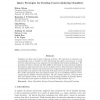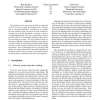976 search results - page 21 / 196 » Evaluating Adversarial Partitions |
EMNLP
2007
13 years 11 months ago
2007
Approaches to plural reference generation emphasise descriptive brevity, but often lack empirical backing. This paper describes a corpus-based study of plural descriptions, and pr...
SEC
2001
13 years 11 months ago
2001
Abstract Traditionally, research in secure group key agreement focuses on minimizing the computational overhead for cryptographic operations, and minimizing the communication overh...
CORR
2010
Springer
13 years 10 months ago
2010
Springer
Classifiers are often used to detect miscreant activities. We study how an adversary can systematically query a classifier to elicit information that allows the adversary to evade...
PRDC
2006
IEEE
14 years 3 months ago
2006
IEEE
This paper presents the performance analysis of several well-known partitioning scheduling algorithms in real-time and fault-tolerant multiprocessor systems. Both static and dynam...
CORR
2008
Springer
13 years 10 months ago
2008
Springer
We consider privacy preserving decision tree induction via ID3 in the case where the training data is horizontally or vertically distributed. Furthermore, we consider the same pro...



